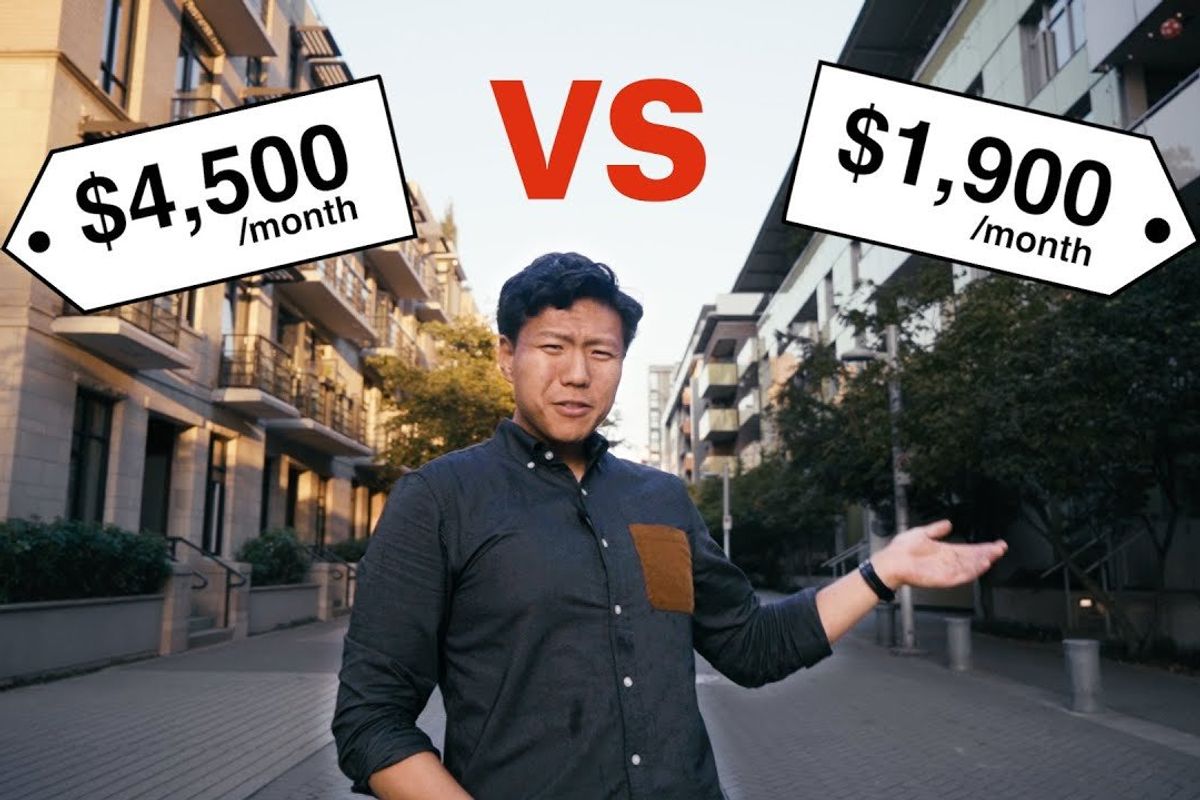Urban planner shares a simple and proven way to cut rents in half
“Housing is ultimately for people, not profits.”

Why is one building so much cheaper?
Over the past few years, one of the most significant contributors to the increase in the cost of living in the U.S. has been skyrocketing rent and housing prices. A big reason for the rise is the lack of housing supply. Estimates show that Americans need to build around 6 million more housing units for supply to meet demand.
If we are going to build more housing units, About Here’s founder urban planner Uytae Lee, suggests that the U.S. and Canada focus on building more non-market co-op units.
He lays out his theory in a video entitled “The Non-Market Solution to the Housing Crisis.”
To illustrate his point, he highlights two apartment buildings side by side in the up-and-coming Olympic Village neighborhood in Vancouver, Canada. In one building, the average rent for a 2 bedroom is $4,500. However, in the building across the street, a 2-bedroom unit only costs $1900 a month.
“So how is this building so affordable? Well, it's really quite simple. It doesn't make money,” Lee says. “This building is owned by the Athletes Village housing co-op, a non-profit cooperative. Like the name suggests, the co-op isn't trying to make a profit from this building. So it sets rents that only cover the building's operating costs, things like heat, water, electricity, taxes, mortgage payments and maintenance.”
“The building next door is a condo that is owned by an individual or corporation who very much wants to make some money from their housing,” Lee continues. “So they can rent it out for well really whatever price they can get. Any money they make on top of their operating costs is the profit they can pocket for themselves.”
Co-ops are often owned by charities, churches and nonprofit organizations that understand housing is a need and want it to be part of their larger mission. There are co-ops for various demographics, whether seniors, refugees, or college students.
If a private building owned by a landlord were constructed simultaneously, their rents would be similar. However, a co-op can lower rent over time while market pressures and profit motives drive the private building upwards.
As market value in a neighborhood increases, landlords raise rent. However, co-ops keep rent at the same level as long as costs remain stable. Further, after the mortgage on the co-op is paid off, its expenses are drastically reduced so that the rent can be lowered.
“Non-market housing promises a home at a stable price right now and an affordable price in the long term,” Lee says.
When there is an abundance of co-ops in a given area, they also have a positive effect on market housing. Lee cites Vienna as an excellent example of non-market housing keeping market rents low. “Private landlords have to compete with non-market housing for the same tenants. They can't afford to inflate the rents because people will apply for the non-market housing next door, where rents can be as low as €551 a month.”
Just as there are barriers to building large private housing projects in North America, building non-market housing also has its problems. The first is cost. Finding non-profits or government agencies willing to fund an entire apartment building is tough. It’s also hard to get housing projects approved when co-ops have to go up against NIMBYs and housing zoning regulations.
“I think first and foremost we need to change these rules and make it easier to build housing in general,” Lee says.
In the end, Lee believes co-op housing isn’t a magic bullet that will solve all our woes. But it should be an integral part of a larger solution. “I think we should be treating all market housing as an important counterbalance,” Lee says. “Something that limits people's ability to exploit the housing shortage in two key ways: adding more supply and setting rents that help to stabilize the overall housing market — sending a reminder to all of us that housing is ultimately for people, not profits.”
- Psychologist breaks down why cruises are good for our mental health ›
- Americans spend up to 50% of their income on rent, reveals Harvard ... ›
- 'This is a joke, right?': Landlord springs sudden $885 rent increase ... ›
- Man challenges 'squatters rights' in his own brilliant way - Upworthy ›
- Real estate broker explains why millennials can't buy homes - Upworthy ›



 Worried mother and children during the Great Depression era. Photo by Dorthea Lange via Library of Congress
Worried mother and children during the Great Depression era. Photo by Dorthea Lange via Library of Congress  A mother reflects with her children during the Great Depression. Photo by Dorthea Lange via Library of Congress
A mother reflects with her children during the Great Depression. Photo by Dorthea Lange via Library of Congress  Families on the move suffered enormous hardships during The Great Depression.Photo by Dorthea Lange via Library of Congress
Families on the move suffered enormous hardships during The Great Depression.Photo by Dorthea Lange via Library of Congress


 Classic Film GIF
Classic Film GIF  Oh nothing, just Edyth, Arthur, and Iris hanging out at the park.
Oh nothing, just Edyth, Arthur, and Iris hanging out at the park.
 It helps that Golden Retrievers are notoriously friendly. Photo by
It helps that Golden Retrievers are notoriously friendly. Photo by